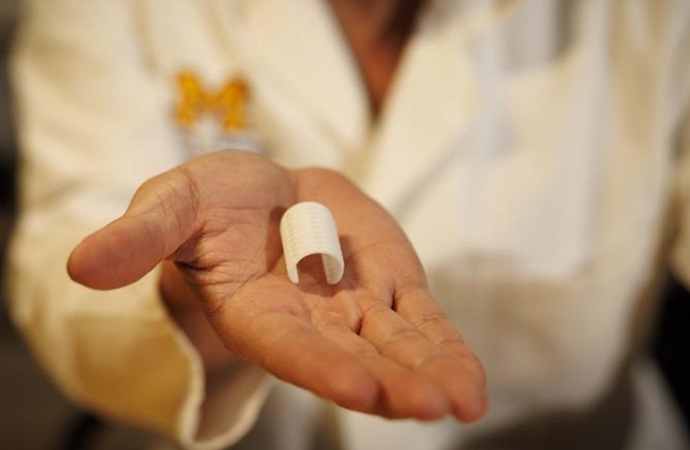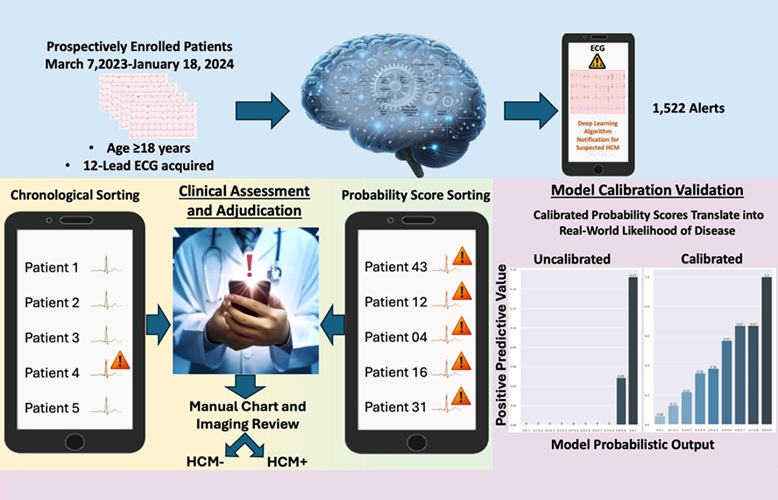First-Of-Its-Kind Bioresorbable Implant to Help Children with Rare Respiratory Disease
|
By HospiMedica International staff writers Posted on 07 Mar 2025 |

Tracheobronchomalacia is a rare, life-threatening condition in which the cartilage in the trachea or mainstem bronchi develops abnormally, causing the airway to collapse and making breathing difficult for children. The severity of the condition can vary and it can also be fatal in some cases. Infants with tracheobronchomalacia often rely on ventilators to survive. While most children with this condition experience mild symptoms that resolve by age three, once the tracheal cartilage strengthens, there has been a lack of treatment options for those with the most severe forms of the disease. A new clinical trial is now underway to explore the use of 3D-printed bioresorbable devices to treat children with tracheobronchomalacia.
The trial, launched by Michigan Medicine (Ann Arbor, MI, USA) and Materialise (Leuven, Belgium), represents a significant step toward full Food and Drug Administration (FDA) approval for these innovative devices designed to support the airways of infants with the most severe cases of the condition. The research began more than ten years ago, focusing on the development of a biodegradable scaffold that could be tailored to each patient, manufactured as a tracheal splint. The device is placed on the outer side of the trachea or mainstem bronchi to help keep the airway open and prevent collapse. It was the first 3D implant designed for children, intended to grow with the patient and be safely absorbed into the body over time. In 2012, the tracheal splint was used for the first time to save the life of a three-month-old with a severe case of tracheobronchomalacia, with the successful outcome published in the New England Journal of Medicine. Through collaboration with the FDA, Institutional Review Board, and hospital administration, the researchers were granted emergency approval to use the bioresorbable scaffolding. For over a decade, the researchers have been able to obtain expanded access approval from the FDA on a case-by-case basis to use a pioneering 3D-printed bioresorbable airway splint for these children under emergency or compassionate use circumstances. The device has been used in over 40 children at Mott but this groundbreaking treatment has only been available to a limited number of patients.
With FDA approval now in place for the 3D-printed bioresorbable devices to be tested in a clinical trial, this marks a crucial step toward achieving full FDA approval for treating children with this life-threatening condition. With the clinical trial now underway, researchers at Michigan Medicine and Materialise are working to enable broader access to the device by evaluating its safety and efficacy. The trial, which opened in January, is currently enrolling its first patients. The study aims to enroll 35 infants over the next eight years from U-M Health C.S. Mott Children’s Hospital and four other children’s hospitals across the United States, with the devices being produced by Materialise. Throughout the trial, the devices will be manufactured by Materialise, a leader in pioneering medical 3D printing applications.
“We have established a process that allows us to offer the customized airway splint as a last resort treatment for certain children with no other options but we need more research to make it available on a wider scale,” said trial principal investigator Richard Ohye, M.D., a pediatric heart surgeon at Mott, who leads surgical implantation of the device.
“The advent of technologies such as 3D printing and advanced visualization techniques has transformed patient-specific care,” added Colleen Wivell, Director of Clinical Engineering at Materialise. “Surgeons increasingly adopt 3D printing as part of their surgical workflow to bring personalized care to patients, improving healthcare and reducing costs overall. We’re so pleased to support this life-saving treatment and look forward to continuing to impact these children and their families.”
Related Links:
Michigan Medicine
Materialise
Latest Surgical Techniques News
- DNA Origami Improves Imaging of Dense Pancreatic Tissue for Cancer Detection and Treatment
- Pioneering Sutureless Coronary Bypass Technology to Eliminate Open-Chest Procedures
- Intravascular Imaging for Guiding Stent Implantation Ensures Safer Stenting Procedures
- World's First AI Surgical Guidance Platform Allows Surgeons to Measure Success in Real-Time
- AI-Generated Synthetic Scarred Hearts Aid Atrial Fibrillation Treatment
- New Class of Bioadhesives to Connect Human Tissues to Long-Term Medical Implants
- New Transcatheter Valve Found Safe and Effective for Treating Aortic Regurgitation
- Minimally Invasive Valve Repair Reduces Hospitalizations in Severe Tricuspid Regurgitation Patients
- Tiny Robotic Tools Powered by Magnetic Fields to Enable Minimally Invasive Brain Surgery
- Magnetic Tweezers Make Robotic Surgery Safer and More Precise
- AI-Powered Surgical Planning Tool Improves Pre-Op Planning
- Novel Sensing System Restores Missing Sense of Touch in Minimally Invasive Surgery
- Headset-Based AR Navigation System Improves EVD Placement
- Higher Electrode Density Improves Epilepsy Surgery by Pinpointing Where Seizures Begin
- Open-Source Tool Optimizes Placement of Visual Brain Implants
- Easy-To-Apply Gel Could Prevent Formation of Post-Surgical Abdominal Adhesions
Channels
Critical Care
view channel
Smart Bandage Monitors Chronic Wounds in Human Patients
A future smart bandage, envisioned as a "lab on skin," could assist both patients and caregivers by not only monitoring chronic wounds but also delivering treatment and accelerating the healing process... Read more
AI Identifies Patients with Increased Lung Cancer Risk Up To 4 Months Earlier
Earlier diagnosis plays a crucial role in improving the prognosis of cancer, as delays in starting therapy are associated with decreased survival rates. In most cases, cancer is first identified when symptoms... Read more
AI Algorithm Identifies High-Risk Heart Patients
Hypertrophic cardiomyopathy (HCM) is a complex condition characterized by the thickening of the heart muscle, which impairs the heart's ability to pump blood effectively. This forces the heart to work... Read more
Next Gen Hemodynamic Monitoring Solution Provides AI-Driven Clinical Decision Support
A new cutting-edge hemodynamic monitoring platform, equipped with predictive artificial intelligence (AI)-based algorithms, is designed to help clinicians proactively manage blood pressure fluctuations... Read morePatient Care
view channel
Portable Biosensor Platform to Reduce Hospital-Acquired Infections
Approximately 4 million patients in the European Union acquire healthcare-associated infections (HAIs) or nosocomial infections each year, with around 37,000 deaths directly resulting from these infections,... Read moreFirst-Of-Its-Kind Portable Germicidal Light Technology Disinfects High-Touch Clinical Surfaces in Seconds
Reducing healthcare-acquired infections (HAIs) remains a pressing issue within global healthcare systems. In the United States alone, 1.7 million patients contract HAIs annually, leading to approximately... Read more
Surgical Capacity Optimization Solution Helps Hospitals Boost OR Utilization
An innovative solution has the capability to transform surgical capacity utilization by targeting the root cause of surgical block time inefficiencies. Fujitsu Limited’s (Tokyo, Japan) Surgical Capacity... Read more
Game-Changing Innovation in Surgical Instrument Sterilization Significantly Improves OR Throughput
A groundbreaking innovation enables hospitals to significantly improve instrument processing time and throughput in operating rooms (ORs) and sterile processing departments. Turbett Surgical, Inc.... Read moreHealth IT
view channel
Printable Molecule-Selective Nanoparticles Enable Mass Production of Wearable Biosensors
The future of medicine is likely to focus on the personalization of healthcare—understanding exactly what an individual requires and delivering the appropriate combination of nutrients, metabolites, and... Read more
Smartwatches Could Detect Congestive Heart Failure
Diagnosing congestive heart failure (CHF) typically requires expensive and time-consuming imaging techniques like echocardiography, also known as cardiac ultrasound. Previously, detecting CHF by analyzing... Read moreBusiness
view channel
Expanded Collaboration to Transform OR Technology Through AI and Automation
The expansion of an existing collaboration between three leading companies aims to develop artificial intelligence (AI)-driven solutions for smart operating rooms with sophisticated monitoring and automation.... Read more















